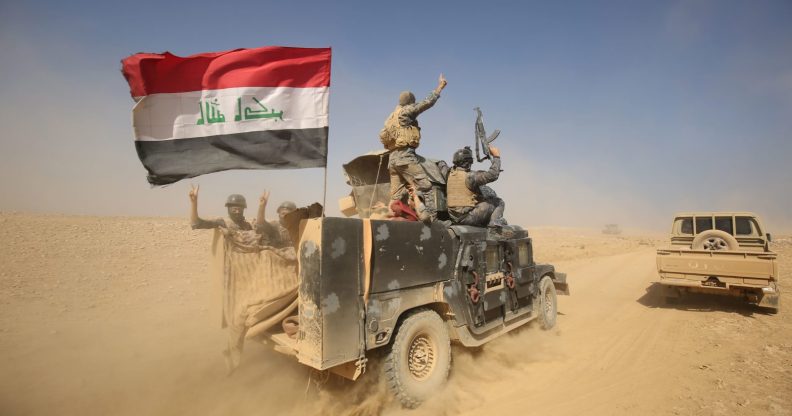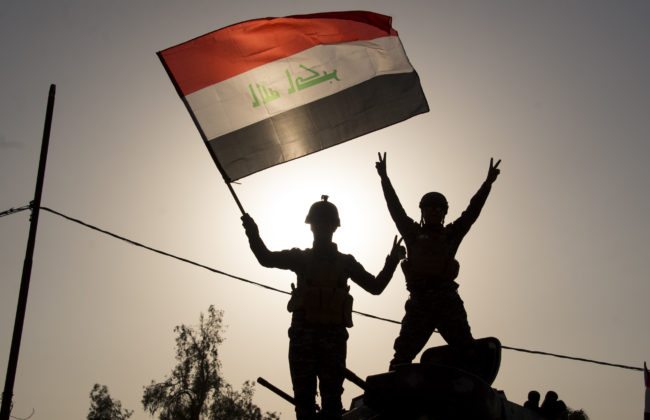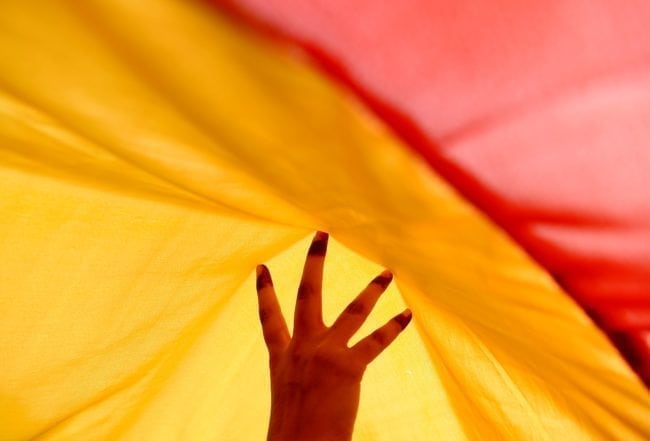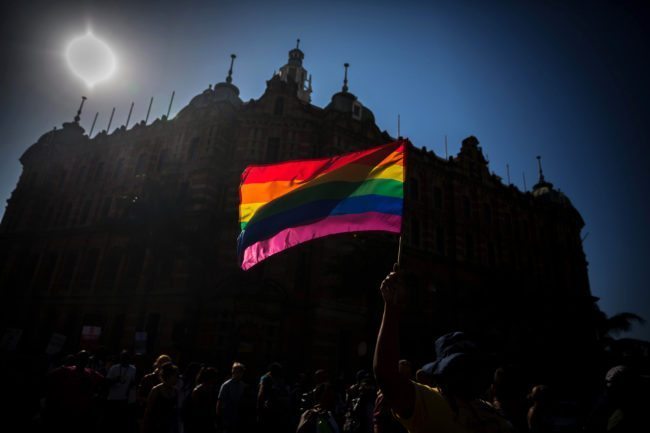96% of LGBT Iraqis face physical or verbal violence

Iraqi forces liberate areas held by ISIS (Photo by AHMAD AL-RUBAYE/AFP/Getty Images)
A new report, released by the group IraQueer, has revealed the state of LGBT rights in Iraq. It found 96% of LGBT Iraqis have faced physical or verbal violence because of their sexuality or gender identity.
The study explained that the queer and trans community faces violence from armed groups, the government and families, friends and neighbours. Every year since 2006, there has been at least one killing campaign against the LGBT community in the country.
Amir Ashour, a spokesperson for IraQueer, told PinkNews: “The fact that 96% of LGBT+ individuals have experienced some form of abuse despite the fact that they are not out to their communities is outrageous and shows a dangerous level of rejection to non-normative people.”

Iraq’s federal police members wave Iraq’s national flag as they celebrate in the Old City of Mosul on July 9, 2017. (FADEL SENNA/AFP/Getty Images)
The report interviewed 257 LGBT Iraqis altogether. Ashour was surprised by the response. “This number might sound small comparing to other studies in countries like the UK. But for a country like Iraq where any kind of public participation kind lead to facing violence and potentially death, this number is positively surprising,” he told PinkNews.
Omar, a 28-year-old gay Iraqi in Lebanon, took part in the report and told IraQueer, “My boyfriend was killed in February 2017. We’ve been together for two years, and he was my only support system. Shortly after that, I had to escape to save my life.”

(SAJJAD HUSSAIN/AFP/Getty Images)
Members of the trans community in particular face extreme danger simply by existing in Iraq. In particular danger are those who choose to undergo hormone treatment and show physical changes.
As hormone treatments and sex operations are not legal in Iraq, transitioning is even more dangerous for those individuals. People who manage to undergo the surgery outside of Iraq face the difficulties in obtaining legal documents that reflect their post surgical identity.
A participant of the survey, Noor, stated: “Accessing hormones that I can use is life-threatening, but every day I wasn’t a girl was a day I thought of committing suicide.” She continued, “I know I will face even more danger when my body starts to change, but I rather die looking like who I really am than to die looking like what the society wanted me to be.”
Since the United States and United Kingdom led invasion in 2003, one might argue that all Iraqis have been facing life-threatening circumstances. But the situation for LGBT people is more dangerous because of a lack of any legal protection and political will on the part of the government to address human rights violations against LGBT individuals, the report states.

(RAJESH JANTILAL/AFP/Getty Images)
The law in Iraq puts the LGBT community at great danger as it deprives them legal recourse to fight back against human rights violations.
The results of the survey suggested the media has a large role in how LGBT people are viewed in Iraqi society. Some 89% of LGBT Iraqis said that media portrayal had negatively influenced their self-portrayal.
One respondent, Saad from Samaraa, told IraQueer how he thought of committing suicide after watching a special program by Al Sharqiyah TV channel in 2014.
According to the 2017 Report by The Broadcasting Board of Governors (BBG), 91% of adults in Iraq get their news and information from TV.
Human Rights Watch estimated the killings of LGBT people in 2012 at more than 200 in Iraq. IraQueer and its partners estimated the killings in 2017 were more 220.
The interviews in the research also exposed how the lesbian community is extremely invisible in Iraq. The report explains that lesbians face double discrimination for being women — who lack the same rights and protections as men — and lesbians who challenge the norms of sexual practices in Iraq. They are often forced into marriage without the ability to express their identities.
Rana from Babylon told IraQueer: “I will die without anyone knowing that I was a lesbian. All the feelings I have, and all the girls I had crushes on will remain secrets I will take with me to my grave. I don’t think I will ever live to see an Iraq that welcomes people like me.”
Ashour said IraQueer is very proud of the publishing of the report: “It’s the first time an Iraqi LGBT+ organisation is able to compile such detailed information about the Human Rights situation of LGBT+ people. The study included LGBT+ individuals and other groups who are aware of what LGBT+ people face in Iraq. For more than a year, our team in Iraq has conducted extensive research in partnership with another local organisation with the support of COC Netherlands,” he told PinkNews.
Read the full report here.

